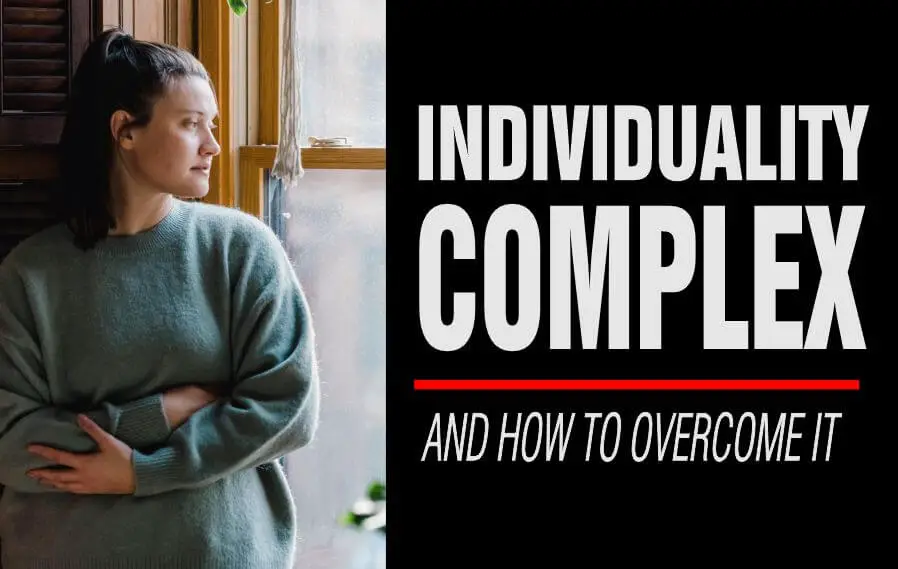Last updated on June 5th, 2025 at 04:58 pm
Discover the roots of individuality complex, expert, and actionable tips to overcome it. Your journey to authenticity begins here!
Growing up, I always wanted to be unique, do something different from my peers, and stand out, but not in a way that would belittle others or trigger envy.
I was scared of being too banal and basic. I needed to have a strong personality and impress people around me.
Everyone has this desire but some circumstances stand in the way.
In my case, upbringing and family were the forces behind my selfhood complex. We were protected so much that we were not allowed to mix with people.
While this was justifiable, it took a toll on my individuality and made me deficient in collectivism and collectivist culture.
In this article, I will explain to you what the individuality problem is and how you can overcome it like me and have an identity of your own.
Table of Contents
- What is An Individuality Complex?
- What Causes Individuality Complex?
- Impacts of Individuality Complex
- Signs and Examples of Individuality Complex
- Pros and Cons of Individuality Complex
- Overcoming Individuality Complex
- How to Promote a Sense of Individuality
- Frequently Asked Questions
- Conclusion
What is An Individuality Complex?

The individuality complex is a psychological phenomenon where you as an individual struggle with developing a sense of your individuality and uniqueness.
It is a psychological state in which you feel overwhelmed by societal pressure to conform and the fear of being judged as different or “weird.”
It is characterized by a strong desire to fit in, leading to an internal conflict between expressing your true self and conforming to what society wants.
People with an individuality problem often struggle with self-acceptance and find it challenging to embrace their unique qualities and interests.
This complex can result in you suppressing your true identity, leading to a lack of fulfillment and authenticity.
Overcoming the selfhood complex requires awareness of self, self-acceptance, and the courage to embrace one’s uniqueness.
Related: How to Strike a Balance between Individuality and Collectivism
What Causes Individuality Complex?

The development of the individuality complex is influenced by various factors, including socio-cultural and psychological factors.
Let’s take a clearer look…
1. Sociocultural Factors
Sociocultural factors are a wide number of societal and cultural influences that affect the thoughts, feelings, behaviours, and mental well-being of humans.
Some sociocultural factors contribute to the individuality problems:
Influence of media and societal ideals: Media plays a significant role in shaping societal ideals and influencing people’s perceptions of what is considered desirable or acceptable. The portrayal of certain body types, lifestyles, and values in media can create pressure for individuals to conform to these ideals, leading to a complex of striving to fit in or meet those standards.
Peer pressure and social norms: Peer groups and social environments have a strong influence on shaping the behaviours and beliefs of individuals. Peer pressure can lead individuals to conform to certain norms or expectations of their social group, which can impact their sense of individuality. For example, you may suppress your unique preferences or interests to be accepted within your peer group.
Related: Traits of a Collectivist Society
2. Psychological Factors
Psychological factors are streaks of your personality that hamper or improve your thought patterns.
These factors contribute to the development of the individuality complex as you can see below:
Personality traits: Each person has unique personality traits, such as introversion/extroversion, openness, agreeableness, neuroticism, etc. These traits influence how you perceive and interpret the world, and they contribute to the development of your selfhood complex.
Self-esteem and self-image: Self-esteem refers to how you perceive and value yourself, while self-image involves the mental picture you have of yourself. Both self-esteem and self-image can affect your confidence in expressing your unique traits, as you may fear rejection or judgment from others.
Family background and upbringing: My individuality complex was a result of family. I had strict parents who were overprotective and shoved aside anything that looked like a threat or bad influence. Family plays a crucial role in shaping your identity and individuality. The values, beliefs, and behaviours learned from family members during upbringing can either encourage or discourage individuality. For instance, if family members prioritize conformity or discourage self-expression, you may develop a complex of suppressing your unique traits.
Related: Navigating the Individualistic Society
Impacts of Individuality Complex

This struggle can have several impacts on both the emotional and social aspects of your life.
Let’s take a closer look…
1. Emotional Implications
Low self-confidence and self-worth: If you experience the selfhood complex, you often feel inadequate and may have low self-esteem. You constantly compare yourself to others, feeling that you don’t measure up or possess unique qualities. This can lead to a lack of self-confidence and a diminished sense of self-worth.
Anxiety and depression: The constant insecurity and self-doubt associated with the complex can contribute to anxiety and depression. You may feel overwhelmed by the pressure to conform and fear being judged or rejected for your perceived lack of individuality. This can manifest as excessive worry, social withdrawal, and a general sense of sadness.
Related: Individualism – Everything you need to know
2. Social Implications
Difficulty in establishing personal identity: Individuals with the selfhood complex may struggle to form a distinct sense of self and personal identity. They may find it challenging to understand their preferences, interests, and values as they constantly seek validation from others. This can result in a lack of direction and internal conflict when making decisions about their own lives.
Strained relationships and approval-seeking behaviour: The individuality complex can lead to strained relationships as you may struggle to express your true self. You may engage in approval-seeking behaviour, constantly seeking validation and acceptance from others. This can result in people-pleasing actions, difficulty setting boundaries, and often compromising personal values to fit in or gain approval.
Signs and Examples of Individuality Complex

This complex can manifest in various ways, and here are a few examples:
1. Non-conformity
Individuals with complex in their individuality may have a strong aversion to conforming to societal norms and expectations.
They often reject mainstream ideas, fashion styles, or cultural trends, opting for unconventional choices that they perceive as more authentic or unique to their own identity.
2. Uniqueness seeking
People with a selfhood complex may actively seek out rare or exclusive experiences, possessions, or knowledge to reinforce their sense of specialness.
They may participate in niche hobbies, collect eccentric items, or strive to be recognized as the first or only person to achieve certain accomplishments.
3. Personal style
The selfhood complex can also manifest through distinctive personal style choices.
People with this complex may intentionally dress in a way that stands out, use unconventional haircuts or colors, or sports tattoos and piercings as a form of self-expression that separates them from the norm.
4. Opinionated nature
Those with an individuality complex may hold strong opinions, often taking contrarian or unconventional viewpoints to distance themselves from mainstream thinking.
They may prioritize their unique perspectives and ideas, valuing their individuality over consensus or popular opinion.
5. Fierce independence
Individuals with complexity in their individuality may strive for complete independence and self-reliance.
They might resist asking for help or support from others, as they perceive it as a threat to their individuality.
They may prioritize personal achievements and resist associations that could compromise their sense of independence.
Related: Understanding Rugged Individualism
Pros and Cons of Individuality Complex
Is individuality complex good or bad? It’s hard to say.
While having a unique personality and standing out is good, being overly sensitive and focused on your uniqueness or distinctiveness might have some negative effects.
From my experience, striking balance is the key. Here are the pros and cons of the selfhood complex:
Pros
Self-expression: A strong individuality complex can encourage people to freely express their opinions, ideas, talents, and unique qualities without fear of judgment or conformity.
Confidence: Embracing individuality can boost self-esteem and confidence, as individuals take pride in their unique perspectives, styles, or achievements.
Creative thinking: Cultivating individuality can enhance creativity and innovation as people bring fresh ideas and perspectives to various aspects of life and work.
Diverse perspectives: An emphasis on individuality can lead to more diverse viewpoints and experiences, which can enrich discussions, problem-solving, and decision-making.
Cons
Isolation: An excessive focus on individuality can lead to isolation or a sense of disconnection from others, as the emphasis on uniqueness may hinder forming genuine connections or fitting into social groups.
Arrogance and superiority: Some individuals with an intense individuality complex may develop a sense of superiority, believing they are more special or important than others, which can lead to alienation and conflicts with others.
Difficulty with collaboration: A strong emphasis on individuality might make it challenging to work collaboratively or compromise in group settings, as individuals may prioritize their ideas and resist conforming to consensus.
Resistance to change: An extreme complexity of individuality can make individuals less open to adapting their views, considering alternative perspectives, or adjusting their behavior to accommodate emerging needs or societal expectations.
Overcoming Individuality Complex

Overcoming the selfhood complex is the process of overcoming the excessive need to conform to societal norms and expectations and embracing your true self.
It involves breaking free from the pressure to fit in and finding the confidence to stand out as an individual.
Here are ways to achieve that:
1. Self-acceptance and Awareness
Acceptance and self-awareness play a crucial role in overcoming the selfhood complex:
Recognizing and challenging societal expectations: This involves becoming aware of the societal norms and expectations that may have influenced your thoughts, beliefs, and behaviours. By questioning and challenging these expectations, you can free yourself from the pressure to conform and adopt a more authentic way of living.
Developing a strong sense of self: This involves cultivating self-awareness and understanding your values, interests, and strengths. It also involves embracing your uniqueness and accepting yourself as an individual. Developing a strong sense of self allows you to let go of the need for validation from others and be more confident in expressing your true self.
2. Support Systems and Help-seeking
Support systems and seeking help are important in overcoming complexes of individuality:
Therapy and counseling: Seeking professional help through therapy or counseling can provide you with the tools and guidance to navigate your journey of self-discovery. These professionals assist in exploring underlying issues, challenging negative thought patterns, and developing coping strategies to overcome the fear of not conforming.
Surrounding oneself with positive influences: Building a support system that consists of positive influences and like-minded individuals can greatly aid in the process of overcoming complexity in individuality. Being with people who accept and appreciate your true self helps feel understood and valued, strengthening your confidence to be authentic.
How to Promote a Sense of Individuality
Promoting a healthy sense of individuality involves nurturing and supporting individuals to express themselves freely, as well as encouraging self-acceptance and self-love.
Here’s a brief explanation of each element:
1. Encouraging Self-expression
You should be able to express your valid self without holding back. Just like me, I overcame my complex by mixing up more and having my own opinion and expressing it.
An unexpressed opinion is as good as a non-opinion. Here are ways to go about that:
Embracing unique talents and interests: Encourage yourself to explore and develop your unique talents and interests. Leverage opportunities to express yourself, such as engaging in artistic activities, joining clubs or groups related to your interest, or pursuing hobbies that align with your passions.
Encouraging creativity and originality: Create an environment that values creativity and originality. Encourage yourself to think outside the box, express your ideas and opinions, and find your solutions to problems. Understand that your perspective is valuable and valid.
2. Encouraging Self-love
Practicing self-care and self-compassion: Engage in promoting self-care practices that help you take care of your physical, mental, and emotional well-being. Encourage individuals to prioritize their needs, set boundaries, practice self-compassion, and engage in activities that promote their overall wellness.
Celebrating individual achievements and milestones: Recognize and celebrate your achievements and milestones. This can include academic, personal, or professional accomplishments. By acknowledging your successes, you are encouraged to appreciate your unique abilities, talents, and strengths, which further enhances your self-acceptance and self-love.
Frequently Asked Questions
Do I have an individuality complex?
Only you can determine if you have a selfhood complex. It may stem from feeling inadequate or constantly comparing yourself to others, impacting your sense of self-worth and uniqueness.
Why do people have individuality complexes?
People may develop complexity in their individuality due to societal pressure, low self-esteem, fear of judgment, or past experiences that lead them to believe their individuality is not valued or accepted.
What is an example of an individuality complex?
An example could be someone constantly changing their appearance, interests, or opinions to fit in or gain approval, disregarding their genuine preferences to conform to others’ expectations.
How do I fix my individuality complex?
Overcoming selfhood complex involves self-acceptance, focusing on your strengths, discovering and embracing your true interests, surrounding yourself with supportive people, and seeking therapy or counseling if needed.
Conclusion
You may develop a complex about your unique identities as we live in a society where you are expected to conform to fixed expectations which can lead to a sense of insecurity and self-doubt.
Overcoming an individuality complex requires self-reflection, self-acceptance, and embracing your distinctive qualities.
It is crucial to understand that true fulfillment comes from expressing yourself authentically, without the fear of judgment or rejection.
Surrounding yourself with supportive people who appreciate diversity can also encourage a positive self-image.
By embracing your individuality, you can unchain yourself from the limitations of societal norms and embark on a path of self-discovery and personal growth.
References:
- https://www.quora.com/Whats-an-individuality-complex
- https://arxiv.org/pdf/1803.08440
- https://www.ncbi.nlm.nih.gov/pmc/articles/PMC7244620/
- https://iqexam.co/blog/what-is-an-individuality-complex/
- https://dudeasks.com/question/whats-an-individuality-complex/
Pious Clements is the insightful voice behind "The Conducts of Life" blog, where he writes about life ethics, self-development, life mastery, and the dynamics of people and society.
With a profound understanding of human behaviuor and societal dynamics, Pious offers thought-provoking perspectives on ethical living and personal growth.
Through engaging narratives and astute observations, he inspires readers to navigate life's complexities with wisdom and integrity, encouraging a deeper understanding of the human experience and our place within society.

